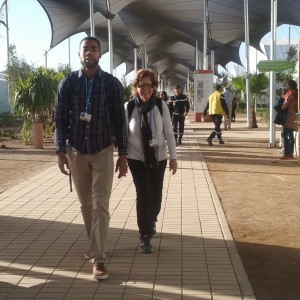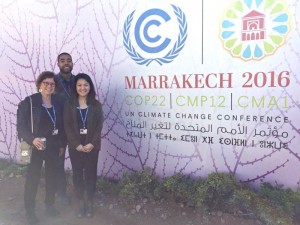On Thursday, 11/17, the second to the last day of COP 22, each nation gave its closing statements in one of the largest plenary tents at the COP. Most statements lasted about 5 minutes, during which ambassadors from departments of environmental protection, sustainability, or interior development from countries around the world reiterated urgency for action on climate, and asserted where improvements are still needed. While COP 21 was popularly considered the “last chance” for the world to lay meaningful groundwork for future carbon emissions commitments, COP 22 has been considered by many “the COP of action” in which the groundwork laid in Paris must be reinforced and furthered. In many ways, it seemed that the outcomes from the COP, in terms of the progress made with building onto the Paris Agreement, was not as concrete as many had hoped. Still, the remarks were varied and in addition to the reasons for concern, many of the countries shared their priorities and their actions which provide reasons to be hopeful about the world’s will to address climate change.

CONCERNS & CALLS FOR IMPROVEMENT
One common concern voiced by many developing nations called on developed nations to craft stronger and clearer Intended Nationally Determined Contributions (INDCs). Malawi, Bhutan, South Sudan, the Democratic Republic of the Congo- who was representing itself and less developed countries (LCDs) in general, and Cuba were among these states who pressed developed nations to take greater actions to curb their carbon emissions. Honduras, generally emphasized the need for INDCs from all nations to be crafted in a clear way so that progress is measurable, so nations can be held accountable for shortfallings, and so areas for improvement are identifiable. The ambassador from Honduras directed these instructions at all nations and not just developed nations.
Many poorer nations in the global South emphasized the fact that while their nation emits relatively little carbon emissions, they are bearing the brunt of the effects of climate change. Of the 14 or so national closing remarks that I sat in on, these concerns were mentioned by all the countries mentioned above. Much aligned with this concern, Honduras, Malawi, and what I believe was Jamaica communicated that they are spending so much of their money on storm recovery that they are unable to make gains in economic growth and disaster mitigation projects. To address challenges like this, the $100 billion dollar Green Climate Fund was proposed several years ago, to be enacted in 2020 for which developed nations would supply the fund to developing nations. While $100 billion may sound substantial, consider that Hurricane Sandy (NJ, 2012) costed $50 billion and Hurricane Katrina costed $129 billion. On the global scale, $100 billion to assist developing nations with climate mitigation, adaption, and disaster recovery is not very much and several countries expressed concern that the fund is woefully inadequate. Others focused on how it should be allotted and there was a reoccurring assertion that much should go towards loss and damage suffered by nations already feeling the drastic effects of climate change.

The representative from Bolivia gave a unique remark in that he not only briefed over on how his country is suffering from and acting on climate, but he also criticized some of the functions of capitalism which he said perpetuate the climate crisis and climate injustice. The representative from Bolivia called out what he termed “ideological colonialism” of climate change which, if I understood correctly, referred to governments of developed nations promoting climate policies that strengthen the corporations within their nations, rather than focusing on doing the most good. The speaker shamefully noted that it is the same corporations who got us into the climate change crisis, who are now trying to pose as the “saviors”. In other worlds, he was pointing to what could be considered large, global scale green-washing. Ultimately, the government official from Bolivia called for a need to “change the capitalist system that perpetuates the climate crisis…to ensure a commitment to life, humanity, and the integrity of our natural home”.
POSITIVE RESPONSES and REINFORCEMENT OF CONTRIBUTIONS
First a disclaimer: I don’t necessarily view nations’ calls for improvement as necessarily negative feedback. I believe this demonstrates that states are taking the situation seriously and are committed to progress. With that said, there were some closing statements that were particularly more hopeful in that they demonstrated how nations are acting now. The nation of Georgia stated that it is “not a passive recipient of (international) aid, but a contributor (as well)”. While noting that it is a relatively low emitter of GHGs, Georgia backed up this statement by explaining how it has been acting in the country’s two areas of focus: one, by helping its neighbors who have higher emissions to make reductions by furthering its own capacity for wind, solar, and geothermal energy which those nations could acquire from Georgia; and two, by fortifying the education system that prepares young people to enter and contribute to a green economy.
The representative from Denmark boasted of the country’s strong offshore power production in what was either wind or hydropower production. He said that Denmark has produced as much as 5 Kw of electricity from these operations (per year I believe) and that this progress demonstrates that offshore energy can compete with the production levels of fossil fuel capabilities. The topic of gender equality was brought up by a few nations including Honduras and Malawi. If I understood correctly this is to include both recognition of how climate change disproportionately effects women as well as how women can and need to be included in developing solutions. Additionally, Honduras emphasized that the transition to a more sustainable world must also strengthen workers’ rights and incorporate sustainable urban development in current construction. Both Honduras and Georgia emphasized the importance of integrating studies on climate and environmental into our education systems and more generally increasing access to education. All four of these themes- women’s’ rights, workers’ rights, sustainable urban development, and education equity are included in the UN’s 17 key objectives for solving climate change.
Finally, nothing was mentioned about a Trump presidency in the closing statements of the national remarks that I attended. Challenges and questions remain: allotting and ensuring an adequate Green Climate Fund- especially for nations already or soon to be dealing with loss and damage; determining how initiatives can effectively address many of the UN’s 17 key objectives; and ensuring that INDCs are concrete and actionable are large tasks. But based on what I witnessed this week, I think the global commitment to solving the greatest crisis of our time has not waned aside from the U.S. The rest of the world is acknowledging the science, and many are already feeling the impacts in their everyday lives as they struggle to obtain safe drinking water, to breath clean air, and to produce and acquire sufficient food, so ignoring the issue is nearly impossible.
I leave the COP with gratefulness looking back at the U.S. commitment to act on climate change under the Obama administration, with shame and frustration for what the upcoming Trump administration claims it wants to do, and with hope looking forward, based on the demonstration of unwavering commitment to action from the global community to tackle the issue of climate change.


